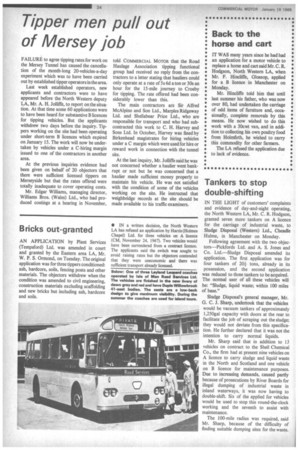Tipper men pull out of Mersey job
Page 36

If you've noticed an error in this article please click here to report it so we can fix it.
FAILURE to agree tipping rates for work on the Mersey Tunnel has caused the cancellation of the month-long 20-vehicles-a-day experiment which was to have been carried out by established tipper operators in the area.
Last week established operators, new applicants and contractors were to have appeared before the North Western deputy LA, Mr. A. H. Jolliffe, to report on the situation. At that time some 60 applications were to have been heard for substantive B licences for tipping vehicles. But the applicants withdrew two days before the inquiry. Tippers working on the site had been operating under short-term B licences which expired on January 15. The work will now be undertaken by vehicles under a C-hiring margin issued to one of the contractors in another area.
At the previous inquiries evidence had been given on behalf of 20 objectors that there were sufficient licensed tippers on Merseyside but that the rates offered were totally inadequate to cover operating costs.
Mr. Edgar Williams, managing director, Williams Bros. (Wales) Ltd., who had produced costings at a hearing in November, told COMMERCIAL MOTOR that the Road Haulage Association tipping functional group had received no reply from the contractors to a letter stating that hauliers could only operate at a rate of 5s 6d a ton or 30s an hour for the 15-mile journey to Crosby for tipping. The rate offered had been considerably lower than this.
The main contractors are Sir Alfred McAlpine and Son Ltd., Marples Ridgeway Ltd. and Shellabear Price Ltd., who are responsible for transport and who had subcontracted this work to C. H. Harvey and Sons Ltd. In October, Harvey was lined by Birkenhead magistrates for hiring vehicles under a C margin which were used for hire or reward work in connection with the tunnel site.
At the last inquiry, Mr. Jolliffe said he was not concerned whether a haulier went bankrupt or not but he was concerned that a haulier made sufficient money properly to maintain his vehicle. He was not satisfied with the condition of some of the vehicles working on the site. He instructed that weighbridge records at the site should be made available to his traffic examiners.




















































































































